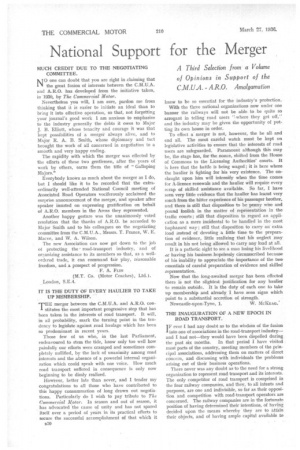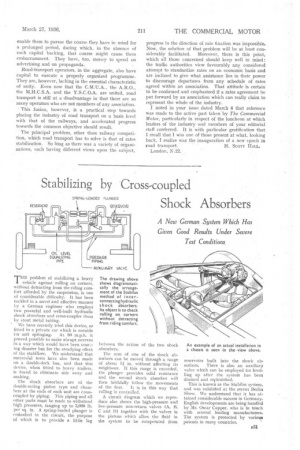National Support for the Merger
Page 44

Page 45

If you've noticed an error in this article please click here to report it so we can fix it.
MUCH CREDIT DUE TO THE NEGOTIATING COMMITTEE.
MO one can doubt that you are right in claiming that the great fusion of interests between the C.M.U.A. and A.R.O. has developed from the initiative taken, in 1930, by The Commercial Motor.
Nevertheless you will, I am sure, pardon me from thinking that it is easier to initiate an ideal than to bring it into effective operation, so that, not forgetting your journal's good work I am anxious to emphasize to the industry generally the debts it owes to Major J. B. Elliott, whose tenacity and courage it was that kept possibilities of a merger always alive, and to Major R. A. B. Smith, whose diplomacy and tact brought the work of all concerned in negotiation to a smooth and very happy ending.
The rapidity with which the merger was effected by the efforts of these two gentlemen, after the years of work by others, earns them the title of " Galloping Majors.'
Everybody knows as much about the merger as I do, but I should like it to be recorded that the extraordinarily well-attended National Council meeting of Associated Road Operators vociferously acclaimed the surprise announcement of the merger, and speaker after speaker insisted on expressing gratification on behalf of A.R.O. members in the Areas they represented.
Another happy gesture was the unanimously voted resolution that the thanks of A.R.O. be accorded to Major Smith and to his colleagues on the negotiating committee from the C.M.U.A., Messrs. T. France, W. E. Macve, and W. A. Wilson.
The new Association can now get down to the job of protecting the road-transport industry, and of orr;anizing assistance to its members so that, as a wellordered trade, it can command fair play, reasonable freedom, and a prospect of progression.
F. A. FLIN (M.T. Co. (Motor Coaches), Ltd.). London, S.E.4.
IT IS THE DUTY OF EVERY HAULIER TO TAKE UP MEMBERSHIP.
THE merger between the C,M.U.A. and A.R.O.. constitutes the most important progressive step that has been taken in the interests of road transport. It will, in all probability, mark the turning point in the tendency to legislate against road haulage which has been so predominant in recent years.
Those few of us who, in the last Parliament, endeavoured to stem the tide, know only too well how painfully our efforts were cramped and sometimes completely nullified, by the lack of unanimity among road interests and the absence of a powerful internal organization which could speak with one voice. How much road transport suffered in consequence is only now beginning to be dimly realized.
However, better late than never, and I tender my congratulations to all those who have contributed to this happy consummation of long drawn out negotiations.. Particularly do I wish to pay tribute to The Commercial Motor. In season and out of season, it has advocated the cause of unity and has not spared itself over a period of years in its practical efforts to secure the successful accomplishment of that which it
e".30 knew to be so essential for the industry's protection.
With the three national organizations now under one banner the railways will not be able to be quite so arrogant in telling road users "s where they get off," and the industry may be given the opportunity of putting its own house in order.
To effect a merger is not, however, the be all and end all. The most careful watch must be kept on legislative activities to ensure that the interests of road users are safeguarded. Paramount although this may be, the stage has, for the nonce, shifted from the House of Commons to the Licensing Authorities' courts. It is here that the battle is being waged ; it is here where the haulier is fighting for his very existence. The onslaught upon him will intensify when the time comes for A-licence renewals and the haulier will require every scrap of skilled anaistance available. So far, I have seen very little evidence that the haulier has learnt very much from the bitter experience of his passenger brother, and there is still that disposition to be penny wise and pound foolish in the matter of representation in the traffic courts; still that disposition to regard an application as a mere incidental to be handled in the most haphazard way; still that disposition to carry an extra load instead of devoting a little time to the preparation of evidence, little realizing that his neglect may result in his not being allowed to carry any load at all.
It is a pathetic sight to see a man losing his livelihood or having his business hopelessly circumscribed because of his inability to appreciate the importance of the two essentials of careful preparation of evidence and skilled representation.
Now that the long-awaited merger has been effected there is not the slightest justification for any haulier to remain outside. It is the duty of each one to lake up membership and already I have seen signs which point to a substantial accretion of strength.
Newcastle-upon-Tyne, 1. W. McKE.ao: THE INAUGURATION OF A NEW EPOCH IN ROAD TRANSPORT.
IF ever I had any doubt as to the wisdom of the fusion into one of associations in the road-transport industryand I had not—they would have been dispelled during the past six months. In that period I have visited most parts of the country, meeting members of the principal associations, addressing them on matters of direct concern, and discussing with individuals the problems arising out of their business operations.
There never was any doubt as to the need for a strong organization to represent road transport and its interests. The only competitor of road transport is comprised in the four railway companies, and they, to all intents and purposes, are one and indivisible, so far as their opposition and competition with road-transport operators are concerned. The railway companies are in the fortunate position of having determined their intentions, of having decided upon the means whereby they are to attain their objects, and of having ample capital available to enable them to pursue the course they have in mind for a prolonged period, during which, in the absence of such capital backing, that course might cause them embarrassment. They have, too, money to spend on advertising and on propaganda.
Road-transport operators, in the aggregate, also have capital to execute a properly organized programme. They are, however, lacking in the essential characteristic of unity. Even now that the C.M.U.A., the A.R.O., the M.H.C.S.A. and the Y.S.C.O.A. are united, road transport is still at a disadvantage in that there are so many operators who are not members of any association.
This fusion, however, is a practical step towards placing the industry of road transport on a basis level with that of the railways, and accelerated progress towards the common objective 'should result.
The principal problem, other than railway competition, 'which road transport has to solve is that of rates stabilization. So long as there was a variety of organizations, each having different views upon the subject,
progress in the direction of rate fixation was impossible. Now, the solution of that problem will be at least con siderably facilitated. Moreover, there is this point, which all those concerned should keep well in mind: the traffic authorities view favourably any considered attempt to standardize rates on an economic basis and are inclined to give what assistance lies in their power to discourage departures from any schedule of rates agreed within an association. That attitude is certain to be confirmed and emphasized if a rates agreement be put forward by an association which can really claim to represent the whole of the industry.
I noted in your issue dated March 6 that reference was made to the active part taken by The Commercial Motor, particularly in respect of the luncheon-at which leaders of the industry and members of your editorial staff conferred. It is with particular gratification that I recall that I was one of those present at what, looking back, I realize was the inauguration of a new epoch in
road transport. H. SCOTT HALL. London, N.22.




























































































